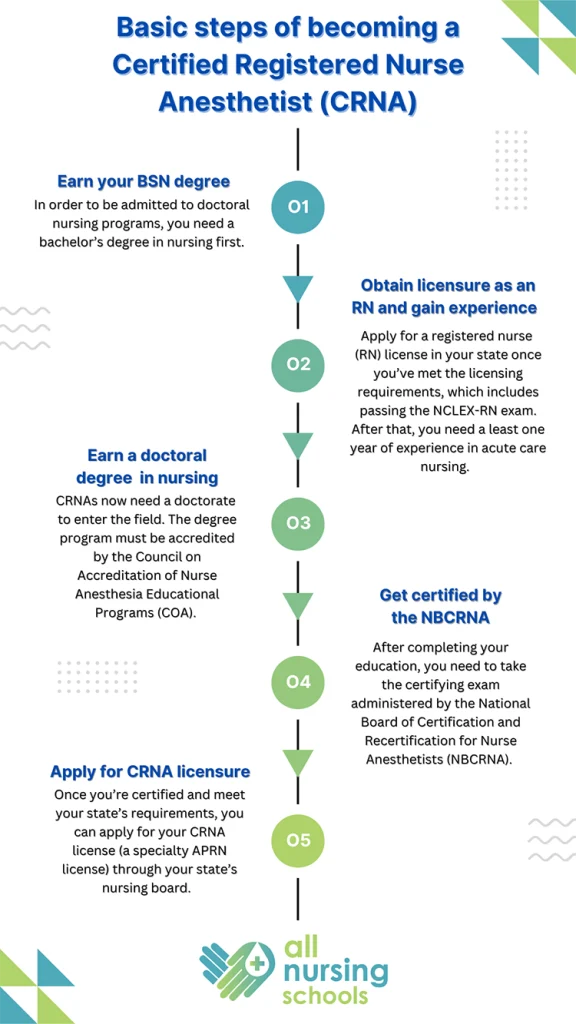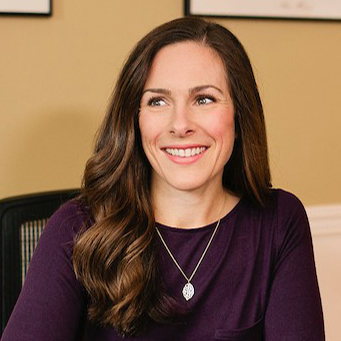Nurse Anesthetist Career and Degree Guide
Other Advanced Nursing Careers
Learn what it takes to become a CRNA.
Providing critical care at some of the most significant times in their patients’ lives, a certified registered nurse anesthetist (CRNA) is responsible for safely administering anesthesia prior to medical procedures. CRNAs are responsible for much of the comfort and safety of their patients, and the role requires extensive education and experience.
In This Article
Overview | Education Requirements | Coursework | Certification | Job Duties | Salary & Job Outlook | Career Advancement
Why Consider Becoming a CRNA?
While it takes time and dedication to become a nurse anesthetist, the work can most certainly pay off. Not only do many CRNAs work independently, but they also make the most money among advanced practice registered nurses (ARPNs). If you’re interested in joining this rewarding and high-paying field, learn about the education you’ll need, job duties, certification requirements, and advancement opportunities.
Working in settings such as hospitals, surgery centers, medical offices, and dental clinics, CRNAs administer anesthesia to patients for surgical, obstetrical, and trauma care procedures.
Not only do many CRNAs work independently, but they also make the most money among advanced practice registered nurses (ARPNs).
CRNAs collaborate with doctors and other nurses to develop pain management plans for each patient. The methods for administering anesthesia vary and can include injections, inhalants, and oral anesthetics.

CRNA Education Requirements
Currently, you need a master’s degree and national certification to become a certified registered nurse anesthetist, but that will change in 2025, when a doctoral degree will be required to enter the field. Per the Council on Accreditation (COA) of Nurse Anesthesia Educational Programs, all CRNA degree programs must include a doctoral degree after January 1, 2021. All students enrolled in CRNA master’s degree programs at that time will be required to transition to a doctoral program.
Since it generally takes two years for a student with an MSN to earn a doctorate, students hoping to beat the DNP deadline would have had to be well into the first year of their doctorate by 2020.
Nursing Groups Welcome the Shift to a Doctoral Degree for CRNAs
Raising the education level to a doctorate for CRNAs has been a long time coming and has strong support from nursing organizations.
“The movement to doctoral education for CRNAs was not a snap decision; rather it was a long-evaluated and thoroughly explored decision,” says John C. Preston, DNSc, CRNA, FNAP, APRN, chief credentialing officer with the National Board of Certification and Recertification for Nurse Anesthetists (NBCRNA).
The American Association of Colleges of Nursing (AACN), a trade group that represents private and public schools of nursing nationwide, also welcomes the change.
“Since 2004, the American Association of Colleges of Nursing has called for doctoral preparation for all advanced practice registered nurses, including certified registered nurse anesthetists (CRNAs),” says Robert Rosseter, AACN spokesman. “We applaud the American Association of Nurse Anesthetists, the Council on the Accreditation of Nurse Anesthesia Educational Programs, and the larger CRNA community for making this transition, which will ensure that patients have access to the highest quality nurse anesthetists possible.”
While the new certification requirements do not specify the type of doctoral degree CRNAs must pursue, the most common choice likely will be the Doctor of Nursing Practice (DNP).
Other options will be:
CRNA Prerequisites
Before beginning a CRNA degree program, you must be a registered nurse (RN) with a Bachelor of Science in Nursing (BSN) degree. You’ll also need at least one year of experience in an acute care setting such as an intensive care unit (ICU) or emergency room (ER), though you might need more depending on the acceptance requirements of your school.
Before you can apply to a master’s program, you’ll need at least one year of experience in an acute care setting.
After meeting these requirements, you can apply to a graduate degree program for nurse anesthetists. To increase their chances of getting accepted, some nurses pursue specialty certification as a critical care registered nurse (CCRN).
Is Accreditation Important?
When applying to master’s programs, make sure the one you choose has been approved by the Council on Accreditation of Nurse Anesthesia Educational Programs (COACRNA). You must graduate from an accredited program to take the certification test.
CRNA Programs: What Will I Study?
All accredited nurse anesthetist programs require studies in the following areas:
In addition, you’ll have supervised clinical practice to apply the theories and techniques you’ve learned in a hands-on way. You’ll work at a university-based or large community hospital and gain experience in a wide variety of procedures, from labor and delivery to open-heart surgery. Learn more about the requirements for getting into a graduate degree program and what you’ll study.
How Many Years to Become a Nurse Anesthetist?
The steps to become a CRNA take a minimum of seven years to complete.
Step
Time
Bachelor’s degree in nursing
Average of four years
RN licensure
Eligible upon completion of bachelor’s degree
Acute care experience
Minimum of one year
Graduate degree (MSN or DNP) in nurse anesthesia
Two to four years
CRNA certification
Eligible upon completion of graduate degree
State licensing
Eligible upon passing CRNA certification exam
Earning a Doctorate: How Long Does It Take?
The time required to earn a doctoral degree in a CRNA program will vary depending on your level of education.
Those with a BSN degree can expect to spend three to four years in a full-time doctoral degree program, while candidates who already hold a master’s degree may be able to earn a doctorate in just one to two years.
Some students choose accelerated programs to save time and money. For instance, a BSN-to-DNP program can take three to four years of full-time coursework, compared to five to six years to complete an MSN and then a doctorate.
Earning CRNA Certification
After completing a master’s program, you’ll be eligible to take the certifying exam administered by the National Board of Certification and Recertification for Nurse Anesthetists (NBCRNA). You’ll answer a minimum of 100 computerized questions, though you may be given up to 170 as the test determines with certainty whether you’ve passed.
If you pass, verification of your certification will be sent to your state board of nursing, at which time you can complete any additional steps required by your state to become a CRNA.
Certification Renewal and Continuing Education
To maintain your national certification, you’ll need to pursue continuing education in line with the NBCRNA’s Continued Professional Certification (CPC) Program. The NBCRNA evaluates nurse anesthetists on an eight-year cycle consisting f two four-year periods. This means that every four years, you must complete:
60 Class A credits on activities directly related to the delivery or improvement of anesthesia care
40 Class B credits on anesthesia practice or professional development topics such as:
Four core modules that address:
In addition, every two years, you’ll complete an online check-in to confirm your state license and that you’ve been continuing to practice.
At the end of each eight-year cycle, you’ll be required to take the CPC Assessment test. This 150-question exam is used to test your knowledge of the four Core Modules of nurse anesthesia.
The test isn’t pass/fail, but if you’re deemed to not meet the performance standards, you’ll need to complete additional continuing education to maintain your certification.
What Does a CRNA Do?
Once you’re on the job, you’ll spend a great deal of time with patients. The day-to-day work of a nurse anesthetist includes:
Many CRNAs also take on administrative duties such as ordering medications, managing finances, and training new staff. They might act as instructors for development courses, hold positions with state boards of nursing, or be involved in organizations that set standards for the medical field.
Nurse Anesthetist vs Anesthesiologist:
What’s the Difference?
Nurse anesthetists and anesthesiologists are both medical professionals who are trained to administer anesthesia to patients. The primary differences between the roles are title and education.
As medical doctors (MDs), anesthesiologists complete at least four years of post-graduate education and four years of residency and earn higher salaries.
While both medical professionals work in a variety of settings, smaller offices tend to employ CRNAs over anesthesiologists. In some states, CRNAs are required by law to work under the supervision of a board-certified physician. In other states, CRNAs can practice independently.
CRNA Salary & Job Outlook
According to the 2023 U.S. Bureau of Labor Statistics (BLS), the median annual salary for nurse anesthetists is $212,650. Compare that to the median wages for other APRNs and it’s clear that nurse anesthetists have by far the highest earning potential in the field.
Salaries for nurse anesthetists and other advanced practice registered nurses:
As a group, the BLS says CRNAs can expect to see job growth of 9% through 2032—much higher than the 3% projection for all other jobs.
CRNA Job Growth Through 2032
How to Get Ahead in Your Career as a CRNA
There are several ways to move up or increase your earning potential as a CRNA. The first is to consider tailoring your education toward a particular patient population, condition, or surgical subfield.
Specializing can open the door for greater opportunities, with popular concentrations including obstetrics, pediatrics, neurosurgery, cardiovascular, and dental surgery, among others. Professional organizations for these specialties can also be beneficial when it comes to networking and applying for jobs.
Where you work can affect what you make. Salaries in the metro areas with the top pay are all above $200,000, says the BLS.
Another option for advancement is to find work in the settings that report the highest salaries for CRNAs. Of the top employers, both general medical/surgical hospitals and outpatient care centers list salaries that are greater than the national average.
Your geographic location can affect what you make as well. Salaries in the top 10 metro areas have four cities with median pay over $200,000, according to the BLS’ Occupational Employment Statistics.

With professional insight from:

John C. Preston, DNSc, SRNA, FNAP, APRN
Chief credentialing officer for the National Board of Certification and Recertification for Nurse Anesthetists (NBCRNA)
